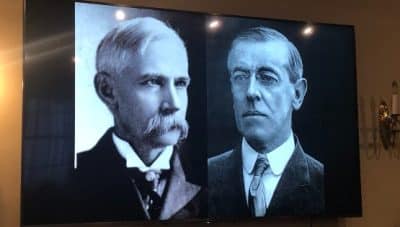
[email protected]
Republicans are talking tough on federal spending and the national debt right now, but where we they just a few years ago when they had control of Congress and the White House?
“Both parties, Republicans and Democrats, have left these issues unaddressed,” said Jeff Vanke, an independent on the ballot for Congress in the Sixth District who will challenge incumbent Republican Congressman Bob Goodlatte in November.
Vanke is making the budget and the national debt a central focus of his campaign. The 40-year-old former college professor proposes tying federal income taxes to the national debt to ensure that everyone, from the working class to the middle class to the wealthy, contibutes toward paying down our debt, within a simplified system stripped of or reducing many existing tax deductions.
“Not one single person in Congress will propose in specifics how to change the course we’re on, but I do,” said Vanke, noting that Goodlatte, who touts his conservative budgeting stands, is part of the problem as well, going along with budgets passed by Republican majorities in the House and Senate and signed into law by President George W. Bush in the 2001-2007 time frame when the GOP was talking the game of spending restraint but acting very much to the contrary of its public positions.
“He’s part of the big spending and deficit spending problem,” Vanke said.
Running as an “independent centrist,” Vanke’s long-term objective is to help build a movement for “moderate, pragmatic, but most importantly principled national solutions.”
“Our current two-party system has a few institutional rules that makes it very hard for somebody to do that or any group to do that,” Vanke said. “Gerrymandering, the overwhelming benefits of incumbency – just their staffs. Including Congressman Goodlatte’s staff in Washington, he has 17 full-time employees. To his credit, he offers great constituent services, but when he does that, people start to identify that with him more than with the office. Their tax dollars are paying for those constituent services.
“What happens is we see perpetuated the corporate interests of the Republicans and the union interests of Democrats,” Vanke said. “The effect is to rule out pragmatic solutions because of the institutional dependency on these restrictive donors and their institutional entrenchment against anybody who tries to come in from outside that two-party system.”
Building an effective third-party movement will not be easy, as Vanke is aware.
“It cannot hinge on a single presidential candidate, because as soon as that person steps aside, the movement collapses. Case in point – Ross Perot,” said Vanke, who aims to build up a slate of state and federal legislative candidates running on a centrist independent ticket.
First things first – Vanke has to build his own campaign organization, and he’s doing so at the outset with the help of student volunteers.
“I’ll need some more help to execute my low-budget, but plausible, plan,” said Vanke, who has studied grassroots political upsets, and is using the effort of the late Minnesota Sen. Paul Wellstone, who unseated a Republican incumbent despite being outspent nearly 7-1, as a guide.
“I need a minimum amount of money. I can’t do it for nothing,” Vanke acknowledged. “I need to be able to print up my literature and a minimum number of yard signs for marketing purposes to be taken seriously. I cannot engage Goodlatte in an arms race, but I also don’t need to.”










